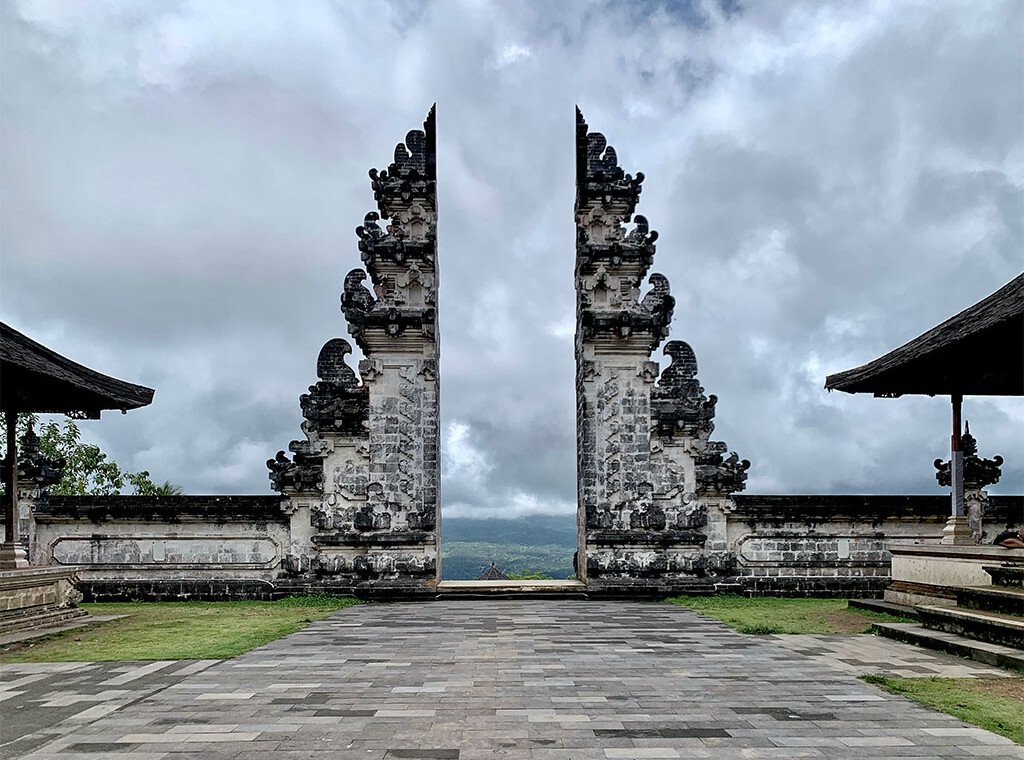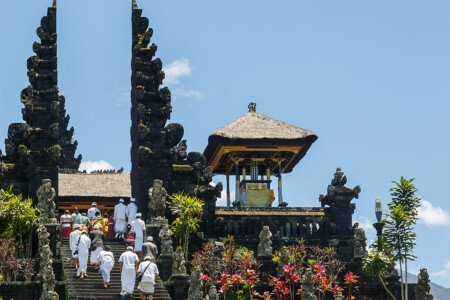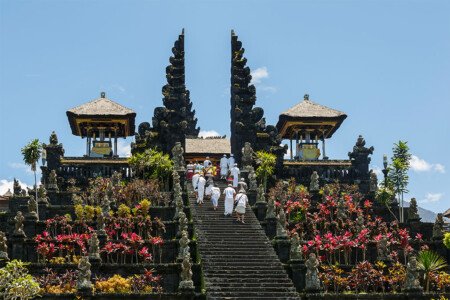Bali is steeped in spirituality. It’s cradled by volcanic mountains, embraced by turquoise seas, and woven with ancient temples that stand as sacred focal points for Balinese Hinduism. In this article, we embark on a mystical exploration of seven iconic temple trails—from the dramatic cliffs of Uluwatu to the sacred slopes of Besakih—uncovering their spiritual essence, enchanting architecture, cultural rituals, and the landscapes that shape them.
1. 🏝️ Uluwatu Temple (Pura Luhur Uluwatu)
Overview
Perched atop a 70-meter limestone cliff on Bali’s southwestern tip, Uluwatu Temple commands commanding views of the endless Indian Ocean. It traces its origins to the 10th century and is one of the six key directional temples intended to ward off negative energies.
Architectural Highlights
- Clifftop location offering dramatic sunset panoramas
- Traditional Bale (pavilions) used for ceremonies
- Intricate carved gates and shrines carved from volcanic stone
Spiritual Vibes
The temple dedication to Sang Hyang Widhi Wasa (the supreme god) makes it a symbol of protection and purification. Rituals such as Melukat (spiritual cleansing) and Padis Agung (rice blessings) often take place here.
Cultural Experience
At 6 PM, the Kecak Fire Dance unfolds against the sunset, an entrancing performance rooted in local myth—particularly the tale of Rama and Sita. It’s a highlight for visitors and a moving reminder of Bali’s mythic heritage.
2. 🌅 Tanah Lot Temple (Pura Tanah Lot)
Overview
Situated on a rocky offshore islet in Bali’s southwest, Tanah Lot is one of Indonesia’s most photographed temples. Dating back to the 16th century, it’s associated with the revered priest Dang Hyang Nirartha.
Architectural Highlights
- A standalone sea temple accessible on foot at low tide
- Surrounded by natural sea caves and undulating waves
- Illuminated nightly, creating luminous reflections
Spiritual Vibes
Tanah Lot is a pilgrimage destination for Balinese Hindus, especially during Purnama (full moon) celebrations when devotees come for evening prayers and offerings.
Cultural Experience
Artisan stalls line the nearby cliff terraces, selling traditional songket, silver jewelry, and seaweed snacks—perfect for exploring pre- or post-temple visit.
3. ⛰️ Besakih Temple (Mother Temple)
Overview
At 1,000 m above sea level on the slopes of Mount Agung, Besakih is Bali’s largest and holiest temple complex—known as the “Mother Temple.” It encompasses more than 80 individual temples dating back over a millennium.
Architectural Highlights
- The largest central shrine, Pura Penataran Agung, features 11 tiers
- Serene terraced courtyards, staircases, and koi ponds
- Elaborate stone carvings depicting Hindu epics
Spiritual Vibes
As the spiritual heart of Bali, Besakih hosts the grand Odalan festival every full moon and during major religious milestones. It’s believed to harness the cosmic energy of Mount Agung.
Cultural Experience
Pilgrims often ascend to the main shrine barefoot, carrying canang sari (flower offerings) and incense—creating a humbling and unifying sense of reverence.
4. 🌄 Lempuyang Temple (Gateway to Heaven)
Overview
Pura Lempuyang Luhur, near Karangasem, is famed for its “Heaven’s Gate” frame—a mystical portal offering symmetrical reflections of Mount Agung if timed just right.
Architectural Highlights
- Twin stone gateways with ornately carved guardians
- Seven temples lining a mountain ridge to the summit
- Misty hillside paths flanked by ancient banyan trees
Spiritual Vibes
Climbing the 1,700+ steps to the top shrines is considered a purification journey. Many pilgrims chant mantras or sing kecak as they ascend.
Cultural Experience
Lined with lush ferns and moss, the stairway is punctuated by rest stops offering coconut drinks and guiding locals. Ideal for sunrise visits—so bring your tripod!
5. 🏞️ Tirta Empul Temple (Holy Water Spring)
Overview
Nestled near Tampaksiring, this temple is centered around a sacred spring believed to have been created by the gods. Established in 926 AD, it remains integral to spiritual cleansing rituals.
Architectural Highlights
- A rectangular pools courtyard fed by natural spring
- Covered arati shrines by each spigot
- Sculpted statues of deities around the water
Spiritual Vibes
Pilgrims partake in Tirta Empul purification, washing their faces, heads, and hearts to heal illness, bad karma, and spiritual burdens. Participants follow strict temple etiquette, crossing legs to show deference.
Cultural Experience
Before entering, many hire local pemangku (priests) for guidance. Nearby stalls sell traditional sarongs and sashes, as well as flower offerings.
6. 🌿 Goa Gajah (Elephant Cave)
Overview
Dating from the 9th century, Goa Gajah is a carved sanctuary near Ubud. Its entrance is shaped like a monstrous demon head, while its interior leads into meditation caverns.
Architectural Highlights
- Demonic mouth over a low arched doorway
- Stone effigies of Ganesha, Shiva, and Nandi
- A reflective bathing pool set amidst a jungle garden
Spiritual Vibes
The name “Elephant Cave” refers either to its Ganesha sculptures or an ancient elephant-shaped chant shrine. It was used for meditation, with the nearby spring feeding a ritual pool.
Cultural Experience
The archaeological park includes lush sculptures and a Buddha relic house. It’s ideal for a peaceful half-day’s exploration of history and contemplation.
7. 🌾 Gunung Kawi Temple (Literary Mountain)
Overview
Set along the Pakerisan River valley near Tampaksiring, Gunung Kawi dates to the 11th century. Regal rock-cut shrines face east toward Mount Agung and tell tales of ancient royalty.
Architectural Highlights
- Ten temple monuments carved deep into the cliff face
- Rice terraces and lush rice paddies frame the site
- A cool, shaded forest leads along descending stone steps
Spiritual Vibes
The mysterious shrines are thought to honor King Anak Wungsu and Queen Sri Bhagavati after death. Pilgrims come to pay respects and experience the aura of ancestral kingship.
Cultural Experience
Plan for 300+ steps along both sides of the river valley. Along the way, villagers offer temple guides and canang sari materials for polite contribution.
🌐 Pilgrimage and Festival Highlights
Major Festivals & Rituals
- Odalan: Temple anniversary—typically celebrated every 210 days throughout Bali
- Nyepi: Day of Silence (around March), which sets the spiritual tone island‑wide
- Galungan & Kuningan: Festival of victory of dharma over adharma
- Full‑Moon Ceremonies: Held monthly at coastal temples for purification
Temple Etiquette & Dress Code
- Sarong (kain) with sash (selendang) is mandatory—often provided at temple entrances
- No loud voices, no pointing; step with your right foot forward to enter shrine zones
- Women on monthly cycles traditionally refrain from temple visits
✨ Practical Tips for the Temple Trails
Best Times to Visit
- Sunrises: Lempuyang, Tirta Empul—be there early for light, cool air, and serenity
- Sunsets: Uluwatu, Tanah Lot—for extraordinary color displays
- Avoid high tides: Tanah Lot is accessible only at low tide
- Midweek visits: Less crowded; photo ops are better
What to Bring
- Sarong and sash (or rent there)
- Light, respectful clothing (no sleeveless shirts, shorts above the knee)
- Water bottle, snacks, sunscreen, hat
- Bug spray in forested or mountainous sites
- Small offerings if joining rituals (flowers, incense, rice)
Transportation Choices
- Private car with driver: Recommended for groups or remote temples like Lempuyang and Besakih
- Scooter: Good for interlinked tours near Ubud or south Bali (Tanah Lot–Tirta Empul)
- Organized temple trail day tours often combine 2–3 sites, include driver, entrance fees, and lunch
🧭 Sample Itineraries
Option A: South‑West Quick Trail (1 Day)
| Temple |
Timing |
Highlights |
| Tanah Lot |
6:30 AM–8:30 AM |
Misty sunrise photos, sea temple walk |
| Uluwatu |
3:00 PM–7:30 PM |
Cliff vistas, sunset Kecak Fire Dance |
Option B: Ubud Spiritual Circuit (1 Day)
- Morning: Goa Gajah + Tirta Empul purification
- Afternoon: Lunch in rice terrace café, followed by Gunung Kawi exploration
Option C: East Bali Pilgrimage (2 Days)
Day 1:
- Early sunrise at Lempuyang (“Gateway to Heaven”)
- Visit Tirta Gangga and Taman Ujung water palaces
Day 2:
- Ascend to Besakih, attend shrine blessings
- Sunset return via Sidemen fruit‑orchard viewpoints
🙏 Cultural Context: Hinduism and Temple Significance
Bali’s temples (pura) embody cosmic and natural harmony. They are meticulously aligned to Mount Agung and the sea, representing the sacred axis. Pujas (prayers) occur daily, with devotional offerings—golden canang, rice, flowers, and fruit—placed in shrines throughout the day.
Key elements to note:
- Tri Hita Karana philosophy: harmonizing with divinity, nature, and fellow humans
- Kala–Maya myth: leading spirits to temples that bind the living and spiritual realms
- Padmasana shrines: open‑air lotus thrones symbolizing Mount Meru, the cosmic center
🔍 Why These Trails Matter
- Embodied Journey: Each trail is a spiritual passage—ascending, cleansing, and witnessing cosmic beauty
- Heritage Architecture: Limestone carvings, water sculptures, cliff‑perched sanctuaries are living though alive art
- Cultural Connection: Witness daily devotions, festivals, dances, local craftsmanship
- Visual Splendor: Cliffs, mountains, rivers, rice terraces—photography nirvana
- Accessible Pilgrimage: Tailor your journey—introspective, adventurous, brief, or immersive
📸 Photo & Reflection Moments
- Uluwatu: Sunset behind Garuda statue; Kecak dance silhouettes
- Tanah Lot: Dramatic tidal shadows and temple silhouette
- Lempuyang: Symmetrical gate reflection of Mount Agung
- Besakih: Sunrise illuminating tiered shrines
- Tirta Empul: Pilgrims in prayerful alignment
- Goa Gajah: Meditation cave light shafts
- Gunung Kawi: Cliff‑cut shrines reflected in the river
🧳 Final Recommendations
- Stay at culturally rich accommodations: Ubud boutique resorts, Sidemen hillside villas, or cliffside Clifftop Uluwatu lodges
- Hire a certified local guide for deeper insight into iconography and temple lore
- Time temples with festival dates—watch remarkable displays of devotion and ceremony
- Respect Balinese etiquette: silence phone, avoid stepping over people, bow at shrines
📝 Conclusion
These seven temple trails offer more than sightseeing—they offer transformative encounters. From the calmed waves at Tanah Lot to the eternity‑struck cliffs at Besakih, each site reveals a facet of Balinese soul—a symbiosis of natural wonder, human devotion, and sacred myth. Whether you’re a pilgrim seeking meaning or a traveler seeking beauty, these temple journeys will etch themselves into your spirit. Bali’s temples await—call it a pilgrimage, call it a vacation; it’s a harmonious journey through earth, sky, and self.










Join The Discussion